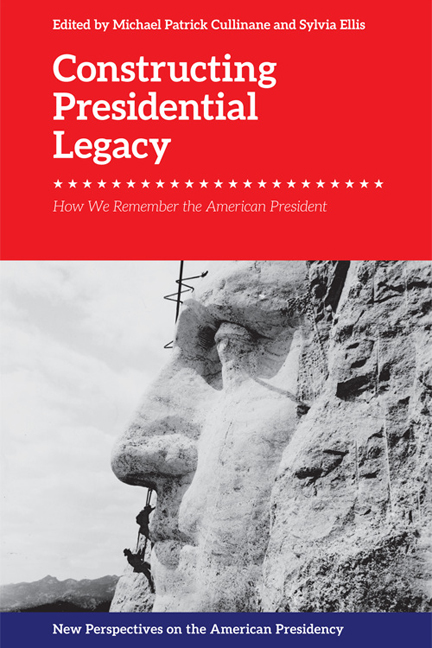Book contents
- Frontmatter
- Contents
- Acknowledgments
- Notes on Contributors
- An introduction to Presidential Legacy
- 1 Presidential Temples: America’s Presidential Libraries and Centers from the 1930s to Today
- 2 Presidential Legacy: A Literary Problem
- 3 Pennsylvania Avenue meets Madison Avenue: The White House and Commercial Advertising
- 4 Eisenhower’s Farewell Address in History and Memory
- 5 Pageantry, Performance, and Statecraft: Diplomacy and the Presidential Image
- 6 “You’ve got to decide how you want history to remember you”: The legacy of Lyndon B. Johnson in film and Television
- 7 The Farewell Tour: Presidential Travel and Legacy Building
- 8 Reflecting or Reshaping?: Landmark Anniversaries and Presidential Legacy
- 9 From a “New Paradigm” to “Memorial Sprawl”: The Dwight D. Eisenhower Presidential Memorial
- 10 Top Trumps: Presidential Legacies, New Technologies, and a New Generation
- Epilogue: Confessions of a Presidential Biographer
- Index
6 - “You’ve got to decide how you want history to remember you”: The legacy of Lyndon B. Johnson in film and Television
Published online by Cambridge University Press: 01 May 2021
- Frontmatter
- Contents
- Acknowledgments
- Notes on Contributors
- An introduction to Presidential Legacy
- 1 Presidential Temples: America’s Presidential Libraries and Centers from the 1930s to Today
- 2 Presidential Legacy: A Literary Problem
- 3 Pennsylvania Avenue meets Madison Avenue: The White House and Commercial Advertising
- 4 Eisenhower’s Farewell Address in History and Memory
- 5 Pageantry, Performance, and Statecraft: Diplomacy and the Presidential Image
- 6 “You’ve got to decide how you want history to remember you”: The legacy of Lyndon B. Johnson in film and Television
- 7 The Farewell Tour: Presidential Travel and Legacy Building
- 8 Reflecting or Reshaping?: Landmark Anniversaries and Presidential Legacy
- 9 From a “New Paradigm” to “Memorial Sprawl”: The Dwight D. Eisenhower Presidential Memorial
- 10 Top Trumps: Presidential Legacies, New Technologies, and a New Generation
- Epilogue: Confessions of a Presidential Biographer
- Index
Summary
Towards the end of the 2013 film The Butler, Cecil Gaines (Forest Whitaker), the eponymous African American servant who waited on every president of the United States from Dwight D. Eisenhower to Ronald Reagan, prepares in his retirement to meet Barack Obama, the first black person to occupy the office. Perhaps sensing the moment is steeped in historical significance, Cecil decides to adorn his attire with mementos given to him by the former bosses that set the United States on the path towards this momentous event. He irons the tie that once belonged to President John F. Kennedy, given to him by Jacqueline Kennedy on the death of her husband. Cecil gives the tie great care and attention, the camera in medium close-up watches him running the iron slowly across it, treating it less as a tie and more as an important historical artifact. Once completed, he holds the tie in his hands, gazing upon it with the awe and reverence it demands. In this moment, the film appears to suggest Obama's victory occurred as a consequence of Kennedy's legacy on civil rights. In this, The Butler conforms to other films about the civil rights movement: while many historians view Kennedy's record on civil rights as a timid, incremental, and largely placatory one driven by political necessity rather than moral imperative, in film and television he is viewed as a martyr to the cause. His successor, Lyndon B. Johnson, who achieved far more tangible progress in this area (dragging Kennedy's Civil Rights bill through the Congressional committee stage to pass it in 1964 and subsequently delivering on his promise of voting rights reform a year later) is barely given credit in popular culture. At the moment when Cecil is ironing the tie, it seems The Butler will repeat the pattern of celebrating Kennedy at the expense of Johnson, but then Cecil reaches for the tie-clip given to him by LBJ (“LBJ for the USA”). He carries it with care and respect, gazing solemnly into the mirror before the camera tilts down to show him appending the clip to the tie.
- Type
- Chapter
- Information
- Constructing Presidential LegacyHow we Remember the American President, pp. 133 - 157Publisher: Edinburgh University PressPrint publication year: 2018



